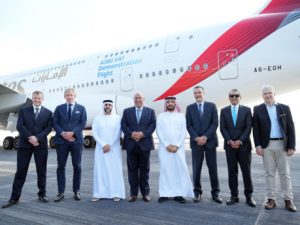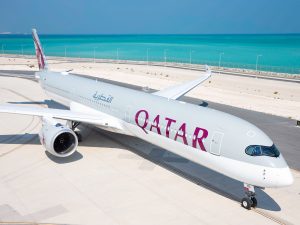Victor announced its commitment to delivering its pioneering climate action strategy in the MENA region. Together with partner Neste, the world’s leading producer of Sustainable Aviation Fuel (SAF), the sector leader is committed to transforming the business aviation landscape in the Middle East and North Africa (MENA) region, by leveraging its learnings from nearly two years’ success in offering SAF directly to private jet flyers worldwide. Focusing on a continued campaign of education and awareness, Victor aims to shift the needle on two core metrics: driving an uplift in voluntary SAF demand from the region’s business aviation flyers and encouraging the adoption of its SAF blueprint by other business and commercial aviation companies across MENA. Having recently relocated its headquarters to Abu Dhabi from the UK, Victor is deepening its commitment to the region and reinforcing its strategic focus on climate action within the MENA markets. The company will build on the success of its ‘Pay Here, Use There’ model, allowing members to purchase Neste MY Sustainable Aviation Fuel™ for every private jet booking – regardless of departure airport. The key learnings from Victor customer behaviour have been encouraging: 1 in 5 private aircraft charterers are willing to pay an additional c.4,500 AED for SAF per booking, providing an average carbon emission reduction of 1.5 tonnes. The average amount of Jet-A fossil fuel Victor customers choose to replace with SAF is 30% per booking. Victor’s aim in 2024 is for at least 1 in 5 MENA customers to buy SAF for their jet charter bookings. This voluntary solution and the SAF purchases it is enabling, is helping to establish a critical new sustainable aviation fuel supply chain, which is necessary …
Read More »Emirates world’s first airline to operate A380 demonstration flight with 100% Sustainable Aviation Fuel
Emirates has become the world’s first airline to operate an A380 demonstration flight using 100% Sustainable Aviation Fuel (SAF). Today’s flight, proudly commanded by Captain Khalid Binsultan and Captain Philippe Lombet, took off from Dubai International Airport (DXB) with one of four engines powered on 100% SAF, helping demonstrate its potential as a drop-in replacement that matches jet fuel’s technical and chemical requirements, while being a more sustainable alternative. SAF can reduce carbon emissions by up to 85%* over the fuel’s life cycle when compared to conventional jet fuel. Demonstration flights like the one conducted today pave the way for future standardisation, qualification and adoption for 100% SAF flying, as governments adopt broader strategies to support the production and scale up of SAF. The A380 demonstration flight underlines the performance and compatibility of SAF, making it a safe and reliable fuel source, and contributes to the growing body of research carried out by the industry to evaluate the beneficial effects of 100% SAF on aircraft performance. SAF is currently capped at a 50% blend limit in engines for commercial flights. The Emirates A380 demonstration flight comes as the aviation industry, international organisations, regulatory bodies and high-level officials driving policy-related decisions converge in Dubai for the Third International Civil Aviation Organization (ICAO) Conference on Aviation and Alternative Fuels (CAAF/3). Dedicated collaborators from Airbus, Engine Alliance, Pratt & Whitney, Neste, Virent and ENOC have been working on the testing, technical assessments and data analysis for today’s flight. The 100% drop-in SAF used on today’s flight includes renewable aromatics and closely mimics the characteristics of conventional jet fuel. This is the first time that drop-in SAF has been used on an A380 aircraft, …
Read More »Qatar Airways signs deal with Shell for sustainable aviation fuel supply at Amsterdam Schiphol Airport
Qatar Airways has signed a deal with Shell to source 3,000 metric tonnes of neat Sustainable Aviation Fuel (SAF) at Amsterdam Schiphol airport. It encompasses the existing jet fuel contract with Shell at Amsterdam which will now see Qatar Airways using at least a 5 per cent SAF blend over the contract period for the fiscal year 2023-2024. The Qatar Airways bilateral agreement with Shell is part of a wider effort initiated by the oneworld alliance, which has a set target of using sustainable aviation fuel (SAF) for 10% of combined fuel volumes by 2030. Qatar Airways is the first carrier in the Middle East and Africa to procure a large SAF amount in Europe beyond government SAF mandates. SAF offers significant potential for decarbonisation as neat SAF can reduce full lifecycle emissions by up to 80% compared to conventional jet fuel.[1] This means that Qatar Airways will be reducing its emissions on flights from Amsterdam by approximately 7,500 tonnes of CO2 for the fiscal year. Qatar Airways Group Chief Executive, His Excellency Mr. Akbar Al Baker, said: “At Qatar Airways, we are strongly committed to supporting the industry’s effort to ramp-up the use of sustainable aviation fuel, as one of the key pillars to decarbonise the aviation industry. Last year, we signed our first offtake agreement in the US, and now we are placing a multi-million US dollar SAF deal in Amsterdam to illustrate our SAF commitment and reiterate our calls for a more robust SAF supply chain across our global network”. “We remain steadfast in our ambitious target of 10 per cent SAF use by 2030 and this announcement, establishes another landmark for Qatar Airways that underlines the positive …
Read More » Tourism Breaking News
Tourism Breaking News


